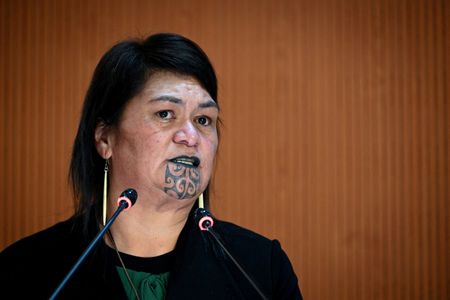 1
1 1
1
By Lucy Craymer
WELLINGTON (Reuters) – New Zealand is carefully managing its relationship with China and must avoid getting pulled from “pillar and post” amid the strategic rivalry between China and the United States, the Pacific nation’s foreign minister said on Friday.
Nanaia Mahuta’s comments come as Chris Hipkins nears the end of a six-day visit to China leading a trade delegation, which included meetings with China President Xi Jinping and Premier Li Qiang focusing on economic partnership and trade.
Hipkins has faced domestic criticism for not spending more time during his visit raising New Zealand’s concerns about human rights violations in Xinjiang.
“China’s a complex relationship that we manage very carefully,” Mahuta said in an interview with Reuters.
She said Hipkins’ focus on trade did not shift New Zealand foreign policy but shows New Zealand has a range of interests with China.
In a statement after Hipkins’ meeting with Xi, there was no mention of human rights concerns or the Taiwan Strait. Both were noted in the readout of the meeting between former Prime Minister Jacinda Ardern and Xi in November 2022.
“I’m under no shadow of a doubt that trade and economic issues would have been discussed, human rights issues, the war in Ukraine,” Mahuta said.
China’s foreign ministry did not immediately respond to a request for comment. A spokesman for China’s embassy in New Zealand said last week that during the past five decades, “through joint efforts and based on mutual respect, seeking commonality while shelving differences” the relationship between the two countries had come a long way.
New Zealand has long been seen as a moderate or even absent voice on China in the Five Eyes intelligence-sharing alliance.
The country’s tone on security and China’s growing presence in the South Pacific toughened last year after China and the Solomon Islands struck a security pact.
Mahuta said the Hipkins visit to China after her own in March reinforces the delicate nature of the relationship.
Mahuta’s trip came under scrutiny this week when The Australian said she had received an hour-long dressing down from her counterpart. She has described the meeting as “very robust.” At the meeting, she said, she noted “deep concerns regarding the human rights situation in Xinjiang and the erosion of rights and freedoms in Hong Kong.”
She said China and New Zealand could have difficult conversations about issues on which they disagreed.
“We’ve maintained diplomatic dialogue with China through some pretty tough times,” she said without elaborating.
She said more broadly that foreign policy and geopolitical challenges were growing increasingly complex, including the impact of climate change on countries, the war in Ukraine and the huge number of refugees who need to be resettled.
“We have a challenge in the Pacific region, in terms of strategic rivalry between two big nations,” she said. “New Zealand is in a position where we want to ensure that we’re not being pulled from pillar to post, that we’re managing significant relationships in a way that we that we can assert our interests.
“We’re a democratic nation. We believe in open, transparent, democratic principles. And we continue to align ourselves with those who hold the same values.”
(Reporting by Lucy Craymer. Editing by Gerry Doyle)